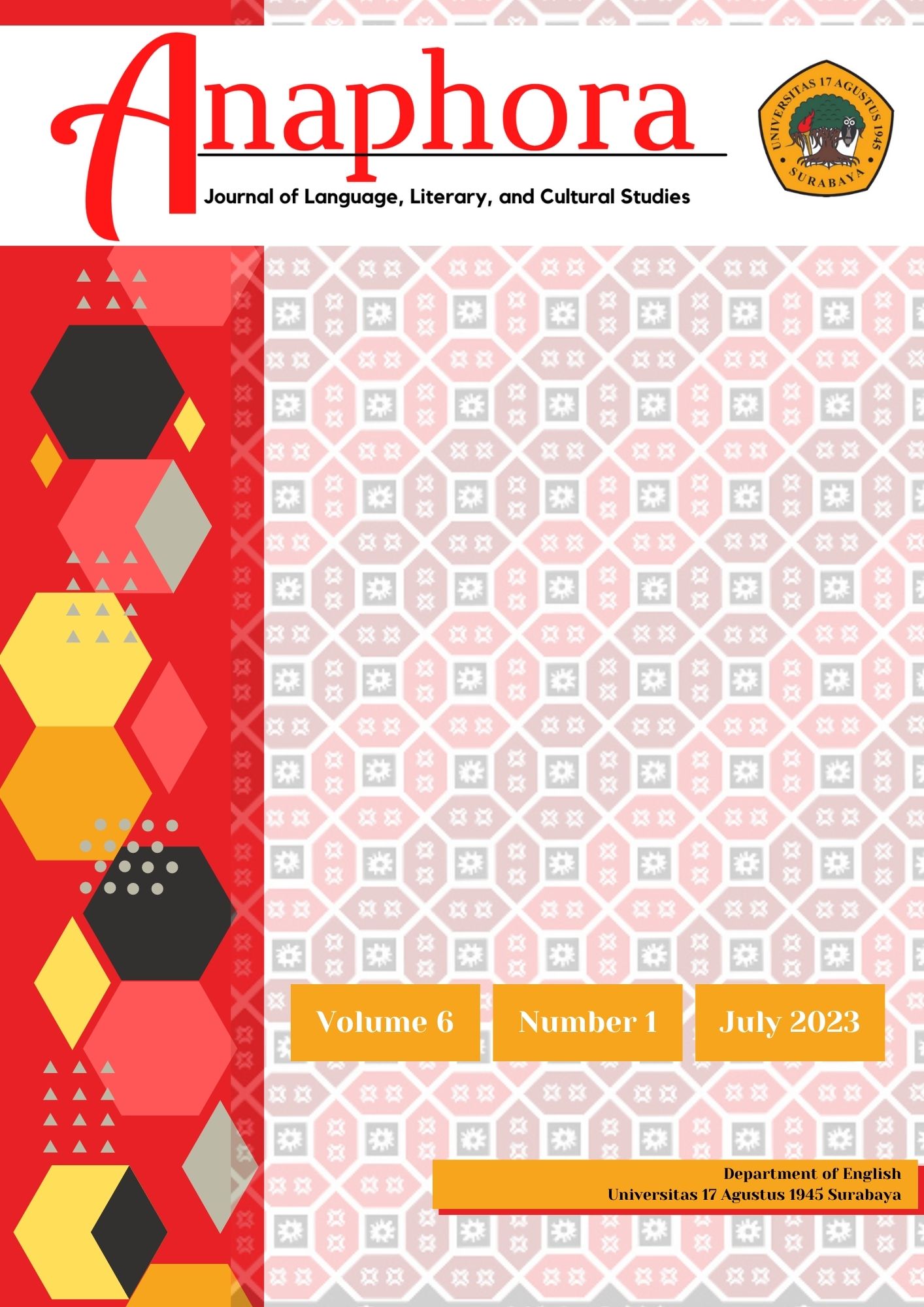Exploring Abstract Writing in the EFL Undergraduate Theses: A Construction-based Analysis
DOI:
https://doi.org/10.30996/anaphora.v6i1.8598Keywords:
abstract, abstract's structure, abstract's format, undergraduate thesisAbstract
An abstract is considered a miniature of a whole series of scientific works. The contents of each chapter in the entire scientific result must be represented in an abstract. However, various abstracts have different structures from one another. Thus, writers of scientific papers have a choice with the appropriate abstract form, but at the same time, they also have problems choosing which structure to use. Therefore, this study aimed to explore the designs of abstract writing from the EFL undergraduate students who different academic advisors guide. A qualitative method with content analysis was employed in this study by examining students' scientific work under the guidance of other supervisors in the form of theses with a focus on the abstract part. As a result of the research, it has been identified that most abstracts employed informative type and structured format with different compositions. In addition, the research results would contribute to the description of the abstract structure utilized by the students as the object of this research. Based on these findings, it can be suggested that understanding abstract construction can be employed by introducing different types of abstract and their format in academic writing courses or research methodology. The lecturer can apply the strategy of compiling leading questions for each abstract type. Answering the leading questions has guided the flow of abstract writing ideas in a thesis.
Downloads
References
Andrade, C. (2011). How to write a good abstract for a scientific paper or conference presentation. 53(2), 172–176. https://doi.org/10.4103/0019-5545.82558
Atanassova, I., Bertin, M., & Larivière, V. (2016). On the composition of scientific abstracts. Journal of Documentation, 72 (4), 636–647. https://doi.org/10.1108/JDOC-09-2015-0111
Bagli, D. (2017). Construction of a scientific abstract. October 2018. https://doi.org/10.1016/j.jpurol.2017.08.010
Basthomi, Y. (2016). Mentoring Penulisan Karya Ilmiah. Jurnal Ilmu Pendidikan Universitas Negeri Malang, 21(1), 107556.
Bengtsson, M. (2016). How to plan and perform a qualitative study using content analysis. NursingPlus Open, 2, 8–14. https://doi.org/10.1016/j.npls.2016.01.001
Bertin, M., & Larivière, V. (2016). On the composition of scientific abstracts On the composition of scientific abstracts. https://doi.org/10.1108/JD-09-2015-0111
Bhatia, V. K., Genre, A., Use, L., Settings, P., Analysis, G., & Preliminaries, T. (1997). Review article On Vijay K . Bhatia : Analysing Genre : Language Use in Professional Set- tings ( 1993 ) Genre Analysis - Step by Step. 19, 207–240.
Bhatti, I. A., Mustafa, Sahar M., & Azher, Musarrat, A. (2019). Genre Analysis of Research Article Abstracts in Linguistics and Literature: A Cross Disciplinary Study. International Journal of English Linguistics; Vol. 9, No. 4; 2019, ISSN 1923-869X E-ISSN 1923-8703. Published by Canadian Center of Science and Education
Bouchrika, I. (2023). Abstract Research Paper: Types, Tips & Best Practices Research.com. https://research.com/research/abstract-research-paper (downloaded 22-04-2023)
Darabad, A. M., & Branch, S. T. (2018). Move Analysis of Research Article Abstracts : A Cross-Disciplinary Study. April 2016. https://doi.org/10.5296/ijl.v8i2.9379
Drury, A., Pape, E., Dowling, M., Miguel, S., Fernández-Ortega, P., Papadopoulou, C., & Kotronoulas, G. (2023). How to Write a Comprehensive and Informative Research Abstract. Seminars in Oncology Nursing, 39, 0–4. https://doi.org/10.1016/j.soncn.2023.151395
Halpern, F., & Phelan, J. (2017). Writing an Effective Abstract: An Audience-Based Approach. https://www.insidehighered.com/advice/2017/02/23/importance-writing-effective-abstract-when-you-submit-journal-article-essay
Harvey, A., Banerjee, A., Tong, G., & Brezovjakova, H. (2019). Anatomy of an abstract: a guide to writing a scientific abstract. April 2020.
Hyland, K. (2009). Academic Discourse: English in a Global Context. London: Continuum International Publishing Group
Labaree, R. V. (2018). Research Guides: Organizing Your Social Sciences Research Paper: 3. The Abstract. Retrieved from http://libguides.usc.edu/writingguide/ abstract
Lowe, R. (1981). WRITING AN Abstract. Australian Journal of Opthalmology, 9(4), 253–253. https://doi.org/10.1111/j.1442-9071.1981.tb00917.x
Maher, C., Hadfield, M., Hutchings, M., & de Eyto, A. (2018). Ensuring Rigor in Qualitative Data Analysis: A Design Research Approach to Coding Combining NVivo With Traditional Material Methods. International Journal of Qualitative Methods, 17(1), 1–13. https://doi.org/10.1177/1609406918786362
Male, H. (2018). A Structural Move Analysis of Abstracts in Undergraduate Theses: A Case Study at Universitas Kristen Indonesia. KnE Social Sciences, 3(9), 284. https://doi.org/10.18502/kss.v3i9.2690
McCombe, S. (2019). How to Write an Abstract | Steps & Examples. Revised by Ryan, E. (2022). https://www.scribbr.com/dissertation/abstract/
Nugraha, D. S. (2022). Abstract in Undergraduate Thesis : a Study of Linguistic Realizations of Rhetorical Moves and Thematic Patterns of Indonesian EFL Students. 6(1), 82–102.
Rahmiati, R. (2015). Analisis Kendala Internal Mahasiswa dalam Menulis Karya Ilmiah. Al Daulah : Jurnal Hukum Pidana Dan Ketatanegaraan, 4(2), 327–343. https://journal.uin-alauddin.ac.id/index.php/al_daulah/article/view/1486
Rusitayanti, N. W. A., Ariawati, N. W., Indrawathi, N. L. P., & Widiantari, N. L. G. (2021). Faktor-Faktor Kesulitan Mahasiswa Menyusun Skripsi Pada Prodi Penjaskesrek FKIP Universitas PGRI Mahadewa Indonesia di Era Adaptasi Kebiasaan Baru Tahun 2021. Jurnal Administrasi Pendidikan Indonesia, 12(2), 138–148.
Sanganyado, E. (2019). How to write an honest but effective abstract for scientific papers. 6, 4–8. https://doi.org/10.1016/j.sciaf.2019.e00170
Sirisilla, S. (2022). Role of an Abstract in Research Paper with Examples. Enago Academy. https://www.enago.com/academy/abstract-in-research-paper/ (downloaded 22-04-2023)
Study Smarter. (2023) Abstract. https://www.studysmarter.us/explanations/english/ summary-text/abstract/
Suntara, W., & Usaha, S. (2013). Research Article Abstracts in Two Related Disciplines: Rhetorical. English Language Teaching; Vol. 6, No. 2; 2013 ISSN 1916-4742 E-ISSN 1916-4750. Published by Canadian Center of Science and Education Variation between Linguistics and Applied Linguistics
Stubbs, M. (2003). English in Today's Research World: A Writing Guide. In English for Specific Purposes (Vol. 22, Issue 4). https://doi.org/10.1016/s0889-4906(02)00025-x
Suwarni, A. (2021). A Genre Analysis of the Undergraduate Thesis Abstracts: Revisiting Swales' Theory of Written Discourse. ELS Journal on Interdisciplinary Studies in Humanities, 4(1), 57–64. https://doi.org/10.34050/elsjish.v4i1.11598
Swales, J. M., & Feak, C. B. (n.d.). Writing of Abstracts VOLUME I OF THE REVISED AND EXPANDED EDITION OF: Vol. I.
Swales, J.M. (2008). Genre Analysis: English in academic and research settings. Cambridge: Cambridge University Press
Swales, J.M. & Feak, C. B. (2009) Abstracts and the Writing of Abstracts. Michigan: The University of Michigan Press
Swales, J. M. & Feak, C. B. (2012). Academic Writing for Graduates Students: Essential Tasks and Skills (3rd Edition) Michigan: The University of Michigan Press.
The Writing Center – University of North Carolina at Chapel Hill. (2023) Abstracts. https://writingcenter.unc.edu/tips-and-tools/abstracts/
The Writing Center-University of Wisconsin – Madison. (2023). Writing an Abstract for Your Research Paper https://writing.wisc.edu/handbook/assignments/writing-an-abstract-for-your-research-paper/
Writing Centre Learning Guide-The University of Adelaide (2023) Writing an Abstract
https://www.adelaide.edu.au/writingcentre/ua/media/26/learningguide-writinganabstract.pdf
Writing Center- Arkansas State University Online (2023) How to Write an Abstract https://www.astate.edu/a/global-initiatives/online/a-state-online-services/online-writing-center/resources/How%20to%20Write%20an%20Abstract1.
Downloads
Published
How to Cite
Issue
Section
License
Authors whose manuscript is published will approve the following provisions:
-
The right to publication of all journal material published on the jurnal anaphora website is held by the editorial board with the author's knowledge (moral rights remain the property of the author).
-
The formal legal provisions for access to digital articles of this electronic journal are subject to the terms of the Creative Commons Attribution-ShareAlike (CC BY-SA) license, which means Jurnal Persona reserves the right to store, modify the format, administer in database, maintain and publish articles without requesting permission from the Author as long as it keeps the Author's name as the owner of Copyright.
-
Printed and electronic published manuscripts are open access for educational, research and library purposes. In addition to these objectives, the editorial board shall not be liable for violations of copyright law.















